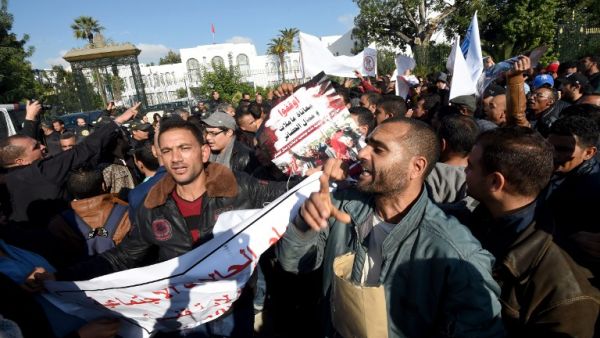The long years of the Tunisian dictatorship are suddenly present again under a chandelier in the exclusive club patronized by the wife of former president Ben Ali.
Hundreds of thousands are listening on television and radio as Sami Brahem tells in a calm voice of the “hell” he suffered while being tortured as a student activist at the beginning of the 1990s.
“Here you have the human rights you’re always talking about,” his tormentors told him, as they dragged him from prison to prison, dunking his head into toilet bowls, beating the soles of his feet with an iron bar until he could no longer stand and pouring ether over his genitals.
Tunisia set up its Truth and Dignity Commission (IVD) in 2013 to help the young democracy heal the wounds of a past of state-sponsored crime. Since then the IVD has heard evidence involving more than 60,000 cases and investigated 10,000 of them.
Last month, victims gave evidence in public for the first time in the upmarket suburb of Sidi Dhrif in Tunis. This weekend it will be the turn of the perpetrators.
“These sessions are an important and historic event for all Tunisians,” says IVD chairman Siham Bensedrine. Dealing with the past is important in closing one chapter and opening a new, in his view.
Torture victims specially selected from different periods of the country’s recent history gave evidence at the first hearings in November.
The commission is working through cases dating from 1957 to 2013, from independence under Habib Bourguiba through the Ben Ali dictatorship up to the Arab Spring.
Mothers of victims who died hold up photographs of their children for the cameras to film.
“The torture was not systematic. It was chaos,” Brahem says. Each of them did what came to him at the moment. The victims are expressing what everyone in fact knows: how the state dealt with those who criticized it.
At the hearings they reveal details of death resulting from torture, abductions, sexual humiliation and illegal detentions.
“It’s essential for the truth to be exposed in order to restore national unity,” says Hichem Cherif, head of the independent Centre for Transitional Justice in Tunis.
But, he insists, this should be accompanied by legal and political reforms as promised in 2013, accusing Tunisia’s political leaders of lacking the will to make the necessary changes.
President Beji Caid Essebsi and Prime Minister Youssef Chahed did not attend the November hearings, nor did representatives of the ruling Nidaa Tounes Party.
While the current political leadership likes to stress national unity and seeks to involve all the different population groups, it prefers to let the past lie.
Although it has now been six years since the country’s youth took to the streets to topple Ben Ali in January 2011, many who worked under the dictatorship continue to hold posts in the current administration.
And many have reason to fear that their role at the time will come under the spotlight.
For his part, Brahem says he is not interested in revenge. His main aim, he tells the IVD, is to ensure that those who come after him do not suffer his fate at some point in the future.
“I know that the people who tortured me are now listening to me,” Brahem says of his life of hell in the 1990s. “If they acknowledge their crimes and apologize, I will be prepared to forgive them.”








